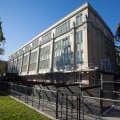When it comes to municipal services, the District Office in Flushing, NY is the place to go for reporting any complaints. The City's 311 system is the recommended way to do this, and it covers a wide range of issues such as potholes, tree pruning, missing or damaged signs, inadequate street lighting, and obstructions of watersheds. When hiring staff for district offices, community boards should take into account the candidate's knowledge and experience with data resources. Many community boards have expressed that data can be very useful for their work, but they don't have the time to invest in it.
This means that many community boards make decisions based on historical and anecdotal data, which they get from their community or from their own experience living or working in the community. To address this issue, the city should make public the technical needs of community boards, and create a more organized relationship between community boards and the DoITT. The Queens Borough President's Office provides an official list of members of Queens Community Board 1.Community boards need access to data on the number, location and saturation of empty storefronts in their districts so they can advocate for laws that regulate commercial rents. Some boards use 311 complaint data to decide which capital and spending priorities should be included in their district needs statements.
The lack of municipal police data in New York has been a major concern for marginalized and objective communities who need better access to information about police interactions with the public in order to push for police reform. The three most common types of municipal and state data that boards refer to in their work are demographic data, data that report on voter complaints, and data that characterize land use. Community boards need training on various topics related to data literacy such as accessing data, analyzing data, using data analysis software (like Excel and RStudio), and using data visualization software (like Carto, Tableau and GIS software). Much of the work of community boards is managed by committees; for example, many boards have separate committees that focus on land use, licensing, transportation, health and human services, and economic development. Since community boards have limited power to influence city decisions, it is important that they have access to information that can serve as evidence for the statements they make in district resolutions and statements of needs.
Community boards must have information about their communities and about the city's processes and resources if they want to do well. We sent digital and printed versions of a survey to all 59 community district offices in New York City, asking them to forward it to their Board of Directors.




